- Home
- Jr. Horatio Alger
The Young Adventurer; or Tom's Trip Across the Plains
The Young Adventurer; or Tom's Trip Across the Plains Read online
Produced by Fox in the Stars, Brenda Lewis, Emmy and theOnline Distributed Proofreading Team at https://www.pgdp.net
THE
YOUNG ADVENTURER
OR
TOM'S TRIP ACROSS THE PLAINS
BY
HORATIO ALGER, JR.
AUTHOR OF "THE BACKWOODS BOY," "FROM CANAL BOY TO PRESIDENT," "WALTER SHERWOOD'S PROBATION," "NED NEWTON," "ADRIFT IN NEW YORK," ETC.
NEW YORK HURST & COMPANY PUBLISHERS
ALGER SERIES FOR BOYS.
UNIFORM WITH THIS VOLUME.
BY HORATIO ALGER, JR.
Adrift in New York. Andy Gordon. Andy Grant's Pluck. Bob Burton. Bound to Rise. Brave and Bold. Cash Boy. Chester Rand. Do and Dare. Driven from Home. Erie Train Boy. Facing the World. Hector's Inheritance. Helping Himself. Herbert Carter's Legacy. In a New World. Jack's Ward. Jed, the Poor House Boy. Julius, the Street Boy. Luke Walton. Making His Way. Only an Irish Boy. Paul, the Peddler. Phil, the Fiddler. Ralph Raymond's Heir. Risen from the Ranks. Sam's Chance. Shifting for Himself. Sink or Swim. Slow and Sure. Store Boy. Strive and Succeed. Strong and Steady. Tin Box. Tom, the Bootblack. Tony, the Tramp. Try and Trust. Young Acrobat. Young Outlaw. Young Salesman.
_Price Post-Paid, 35c. each, or any three books for $1.00._
HURST & COMPANY PUBLISHERS, NEW YORK.
CONTENTS
CHAPTER PAGE I MARK NELSON'S FAMILY 3 II TOM FINDS A WALLET 10 III TOM ASKS A LOAN 17 IV TOM ASKS LEAVE OF ABSENCE 25 V TOM RAISES THE MONEY 33 VI TOM ARRIVES IN PITTSBURG 42 VII THE PITTSBURG HOUSE 51 VIII GRAHAM IN HIS TRUE COLORS 59 IX THE "RIVER BELLE" 68 X ON THE STEAMER 76 XI THE FIRST DAY ON THE RIVER 85 XII NO. 61 AND NO. 62 94 XIII GRAHAM'S DISAPPOINTMENT 104 XIV COMING TO AN UNDERSTANDING 113 XV THE ALLEGHANY HOUSE 117 XVI THE EVENTS OF A MORNING 122 XVII TOM'S ARREST 131 XVIII TOM GETS OUT OF HIS DIFFICULTY 140 XIX A MISSOURI TAVERN 149 XX ST. JOE 158 XXI HOW THINGS WENT ON AT HOME 167 XXII THE YOUNG MAN FROM BOSTON 175 XXIII MR. PEABODY'S TROUBLES 184 XXIV A SAD SIGHT 192 XXV A NIGHT PANIC 201 XXVI MR. PEABODY IS WORSTED 209 XXVII THE LOST HORSE 217 XXVIII INDIAN CASUISTRY 221 XXIX A RACE FOR LIFE 230 XXX TOM BECOMES AN INDIAN 234 XXXI TOM GIVES A MAGICAL SOIREE 240 XXXII TOM'S ESCAPE 247
THE YOUNG ADVENTURER.
CHAPTER I.
MARK NELSON'S FAMILY.
"I wish I could pay off the mortgage on my farm," said Mark Nelsonsoberly, taking his seat on the left of the fireplace, in the room wherehis wife and family were assembled.
"Have you paid the interest, Mark?" asked his wife.
"Yes; I paid it this afternoon, and it has stripped me of moneycompletely. I have less than five dollars in my pocketbook toward buyingyou and the children clothes for the winter."
"Never mind me," said his wife cheerfully. "I am pretty well providedfor."
"Why, mother," said Sarah, the oldest daughter, a girl of fourteen; "youhaven't had a new dress for a year."
"I have enough to last me till spring, at any rate," said the mother.
"You never buy anything for yourself."
"I don't go in rags, do I?" asked Mrs. Nelson, with a smile.
Mrs. Nelson had a happy disposition, which led her to acceptuncomplainingly, and even cheerfully, the sacrifices which, as the wifeof a farmer in poor circumstances, she was compelled to make.
"You are right, Sarah," said Mark Nelson. "Your mother never seems tothink of herself. She might have been much better off if she had notmarried me."
The children did not understand this allusion. They had never been toldthat their mother had received an offer from Squire Hudson, thewealthiest man in the village, but had chosen instead to marry MarkNelson, whose only property was a small farm, mortgaged for half itsvalue. Her rejected admirer took the refusal hard, for, as much as itwas possible for him, he loved the prettiest girl in the village, asMary Dale was generally regarded. But Mary knew him to be cold andselfish, and could not make up her mind to marry him. If she had doneso, she would now be living in the finest house in the village, withthe chance of spending the winter in New York or Boston, instead ofdrudging in an humble home, where there was indeed enough to eat, butlittle money for even necessary purposes. She had never regretted herdecision. Her husband, though poor, was generally respected and liked,while the squire, though his money procured him a certain degree ofconsideration, had no near or attached friends.
To Squire Hudson many in the village paid tribute; for he held mortgageson twenty farms and buildings, and was strict in exacting prompt paymentof the interest semi-annually. It was he to whom Mark Nelson's farm wasmortgaged for two thousand dollars. The mortgage had originally been forfifteen hundred dollars, but five years before it had been increased totwo thousand, which represented more than half the sum which it wouldhave fetched, if put up for sale. The interest on this sum amounted to ahundred and twenty dollars a year, which Mark Nelson always found ithard to raise. Could he have retained it in his hands, and devoted it tothe use of his family, it would have helped them wonderfully, with Mrs.Nelson's good management.
Tom, the oldest boy, now approaching his sixteenth birthday, looked upfrom a book he was reading. He was a bright-looking boy, with brownhair, a ruddy complexion, and dark-blue eyes, who looked, and was, frankand manly.
"What is the amount of your interest?" he asked.
"Sixty dollars every half-year, Tom. That is what I paid to SquireHudson this afternoon. It would have made us very comfortable, if I onlycould have kept it."
"It would have done you more good than the squire," said Sarah.
"He has more money than he knows what to do with," said her father,almost complainingly. "It seems hard that money should be so unevenlydistributed."
"Money is not happiness," said Mrs. Nelson quietly.
"No; but it helps to buy happiness."
"I don't think Squire Hudson is as happy a man as you, Mark."
Mark Nelson's face softened as he surveyed his wife and children.
"I am happy at home," he said, "and I don't think the squire is."
"I am sure he isn't," said Tom. "Mrs. Hudson is sour and ill-tempered,and Sinclair--the only child--is a second edition of his mother. He isthe most unpopular boy in the village."
"Still," said the farmer, not quite convinced, "money is an importantelement of happiness, and a farmer stands a very poor chance ofacquiring it. Tom, I advise you not to be a farmer."
"I don't mean to be if I can help it," said Tom. "I am ready for anyopening that offers. I hope some day to pay off the mortgage on thefarm, and make you a free man, father."
"Thank you for your good intentions, Tom; but two thousand dollars is alarge sum of money."
"I know it, father; but I was reading in a daily paper, not long since,of a boy, as poor as myself, who was worth twenty-five thousand dollarsby the time he was thirty. Why shouldn't this happen to me?"
"Don't build castles in the air, Tom," said his mother sensibly.
"At least, mother, I may hope for good luck. I have been wanting to talkto you both about my future prospects. I shall be sixteen next week,and it is time I did something."
"You are doing something--working on the farm now, Tom."
"That don't count. Father advises me not to be a farmer, and I agreewith him. I think I am capable of making my way in the world in someother way, where I can earn more money. There is Walter, who likes thecountry, to stay with you."
Walter, the third child, was now twelve years of age, with decidedcountry tastes.
"I would like to be a farmer as well as anything," said Walter. "I likethe fresh air. I shouldn't like to be cooped up in a store, or to livein the city. Let Tom go if he likes."
"I have no objection," said Mr. Nelson; "but I have neither money norinfluence to help him. He will have to make his own way."
"I am not afraid to try," said Tom courageously. "From this day I willlook out for a chance, if you and mother are willing."
"I shall not oppose your wishes, Tom," said Mrs. Nelson gravely, "thoughit will be a sad day for me when you leave your home."
"That isn't the way to look at it, mother," said Tom. "If gold piecesgrew on currant bushes, it wouldn't be necessary for me to leave hometo make a living."
"I wish they did," said Harry, a boy nine years of age.
"What would you do then, Harry?" asked his brother, smiling.
"I would buy a velocipede and a pair of skates."
"I heard of a boy once who found a penny in the field, right under apotato-vine," said Walte
r.
"I don't believe it," said Harry.
"It's true, for I was the boy."
"Where did it come from?"
"Tom put it there to fool me."
"Won't you put one there to fool me, Tom?" asked Harry.
"You are too smart, Harry," said Tom, laughing. "My pennies are too fewto try such experiments. I hope, by the time you are as old as Walter,to give you something better."
The conversation drifted to other topics, with which we are notconcerned. Tom, however, did not forget it. He felt that an importantquestion had that evening been decided for him. He had only thought ofmaking a start for himself hitherto. Now he had broached the subject,and received the permission of his father and mother. The world was allbefore him where to choose. His available capital was small, it is true,amounting only to thirty-seven cents and a jack-knife; but he had,besides, a stout heart, a pair of strong hands, an honest face, andplenty of perseverance--not a bad equipment for a young adventurer.

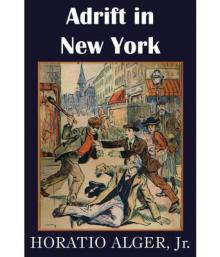 Adrift in New York: Tom and Florence Braving the World
Adrift in New York: Tom and Florence Braving the World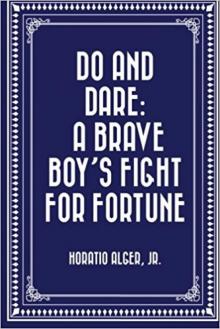 Do and Dare — a Brave Boy's Fight for Fortune
Do and Dare — a Brave Boy's Fight for Fortune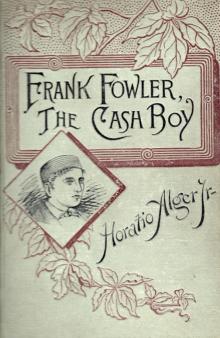 The Cash Boy
The Cash Boy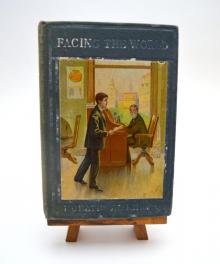 Facing the World
Facing the World The Young Explorer; Or, Claiming His Fortune
The Young Explorer; Or, Claiming His Fortune The Store Boy
The Store Boy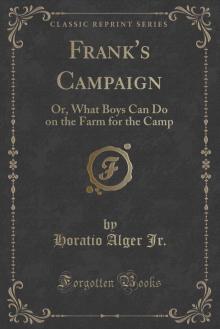 Frank's Campaign; Or, The Farm and the Camp
Frank's Campaign; Or, The Farm and the Camp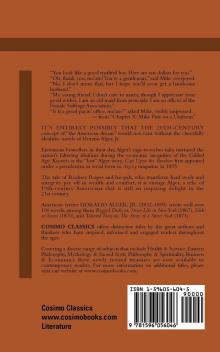 Cast Upon the Breakers
Cast Upon the Breakers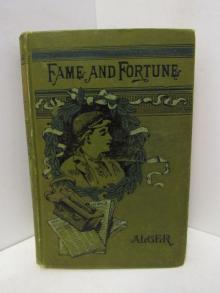 Fame and Fortune; or, The Progress of Richard Hunter
Fame and Fortune; or, The Progress of Richard Hunter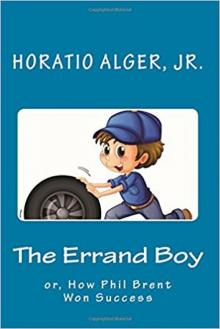 The Errand Boy; Or, How Phil Brent Won Success
The Errand Boy; Or, How Phil Brent Won Success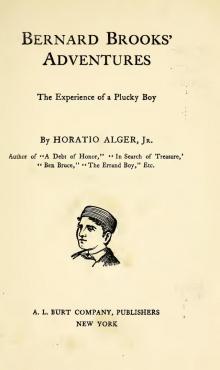 Bernard Brooks' Adventures: The Experience of a Plucky Boy
Bernard Brooks' Adventures: The Experience of a Plucky Boy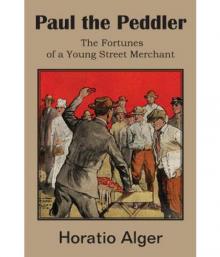 Paul the Peddler; Or, The Fortunes of a Young Street Merchant
Paul the Peddler; Or, The Fortunes of a Young Street Merchant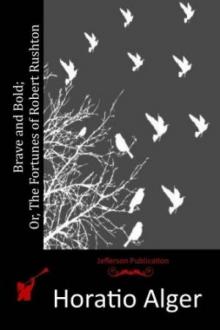 Brave and Bold; Or, The Fortunes of Robert Rushton
Brave and Bold; Or, The Fortunes of Robert Rushton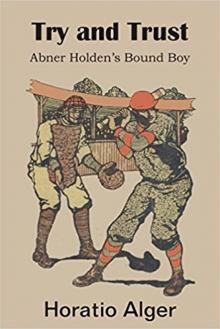 Try and Trust; Or, Abner Holden's Bound Boy
Try and Trust; Or, Abner Holden's Bound Boy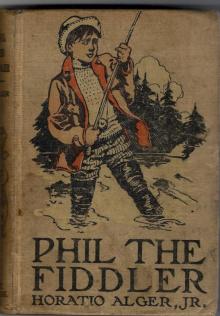 Phil, the Fiddler
Phil, the Fiddler In A New World; or, Among The Gold Fields Of Australia
In A New World; or, Among The Gold Fields Of Australia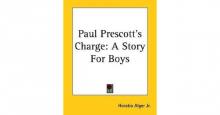 Paul Prescott's Charge
Paul Prescott's Charge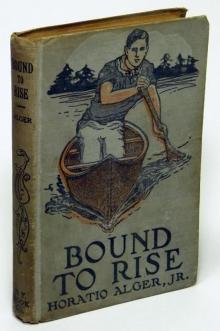 Joe's Luck; Or, Always Wide Awake
Joe's Luck; Or, Always Wide Awake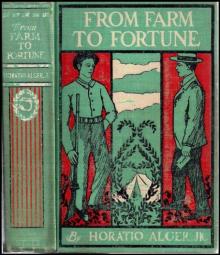 From Farm to Fortune; or, Nat Nason's Strange Experience
From Farm to Fortune; or, Nat Nason's Strange Experience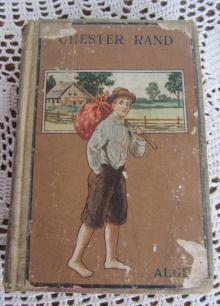 Chester Rand; or, The New Path to Fortune
Chester Rand; or, The New Path to Fortune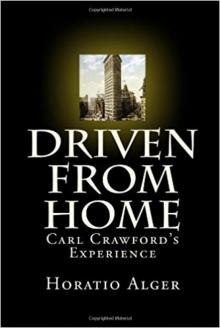 Driven from Home; Or, Carl Crawford's Experience
Driven from Home; Or, Carl Crawford's Experience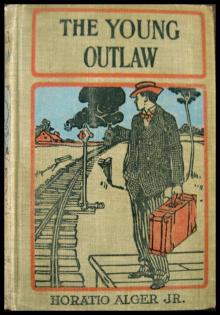 The Young Outlaw; or, Adrift in the Streets
The Young Outlaw; or, Adrift in the Streets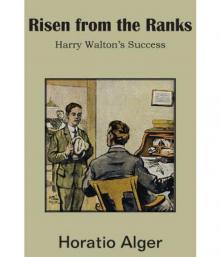 Risen from the Ranks; Or, Harry Walton's Success
Risen from the Ranks; Or, Harry Walton's Success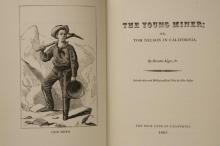 The Young Miner; Or, Tom Nelson in California
The Young Miner; Or, Tom Nelson in California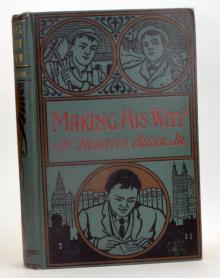 Making His Way; Or, Frank Courtney's Struggle Upward
Making His Way; Or, Frank Courtney's Struggle Upward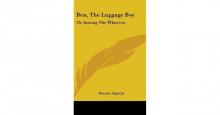 Ben, the Luggage Boy; Or, Among the Wharves
Ben, the Luggage Boy; Or, Among the Wharves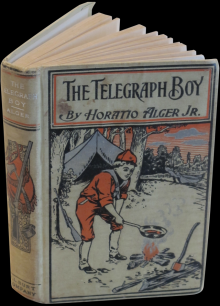 The Telegraph Boy
The Telegraph Boy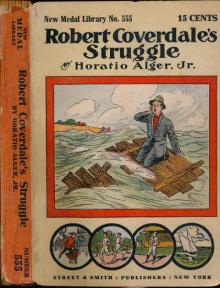 Robert Coverdale's Struggle; Or, on the Wave of Success
Robert Coverdale's Struggle; Or, on the Wave of Success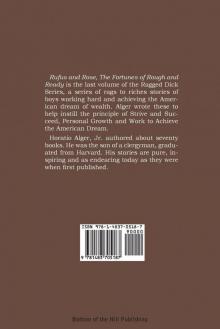 Rufus and Rose; Or, The Fortunes of Rough and Ready
Rufus and Rose; Or, The Fortunes of Rough and Ready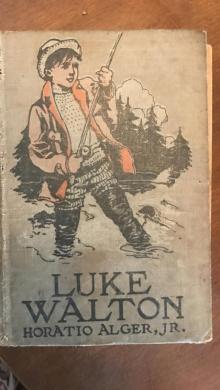 Luke Walton
Luke Walton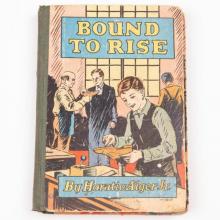 Mark Mason's Victory: The Trials and Triumphs of a Telegraph Boy
Mark Mason's Victory: The Trials and Triumphs of a Telegraph Boy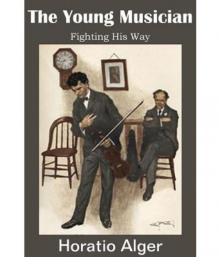 The Young Musician; Or, Fighting His Way
The Young Musician; Or, Fighting His Way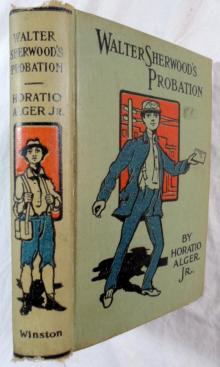 Walter Sherwood's Probation
Walter Sherwood's Probation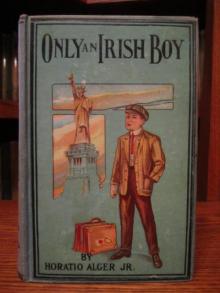 Only an Irish Boy; Or, Andy Burke's Fortunes
Only an Irish Boy; Or, Andy Burke's Fortunes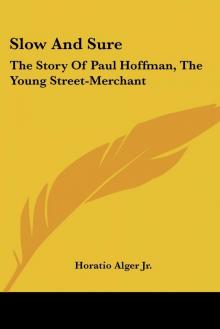 Slow and Sure: The Story of Paul Hoffman the Young Street-Merchant
Slow and Sure: The Story of Paul Hoffman the Young Street-Merchant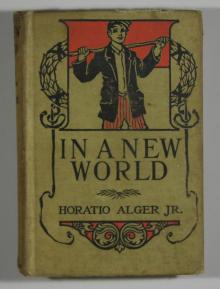 Herbert Carter's Legacy; Or, the Inventor's Son
Herbert Carter's Legacy; Or, the Inventor's Son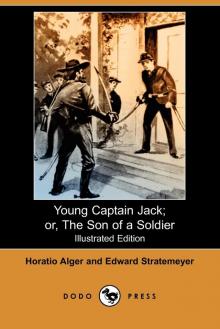 Young Captain Jack; Or, The Son of a Soldier
Young Captain Jack; Or, The Son of a Soldier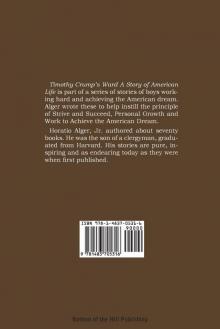 Timothy Crump's Ward: A Story of American Life
Timothy Crump's Ward: A Story of American Life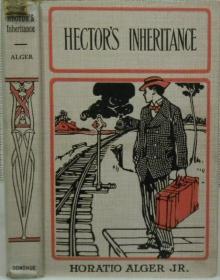 Hector's Inheritance, Or, the Boys of Smith Institute
Hector's Inheritance, Or, the Boys of Smith Institute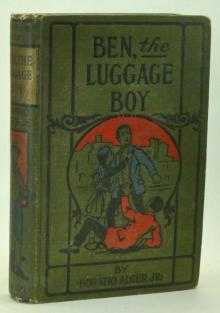 Ben's Nugget; Or, A Boy's Search For Fortune
Ben's Nugget; Or, A Boy's Search For Fortune